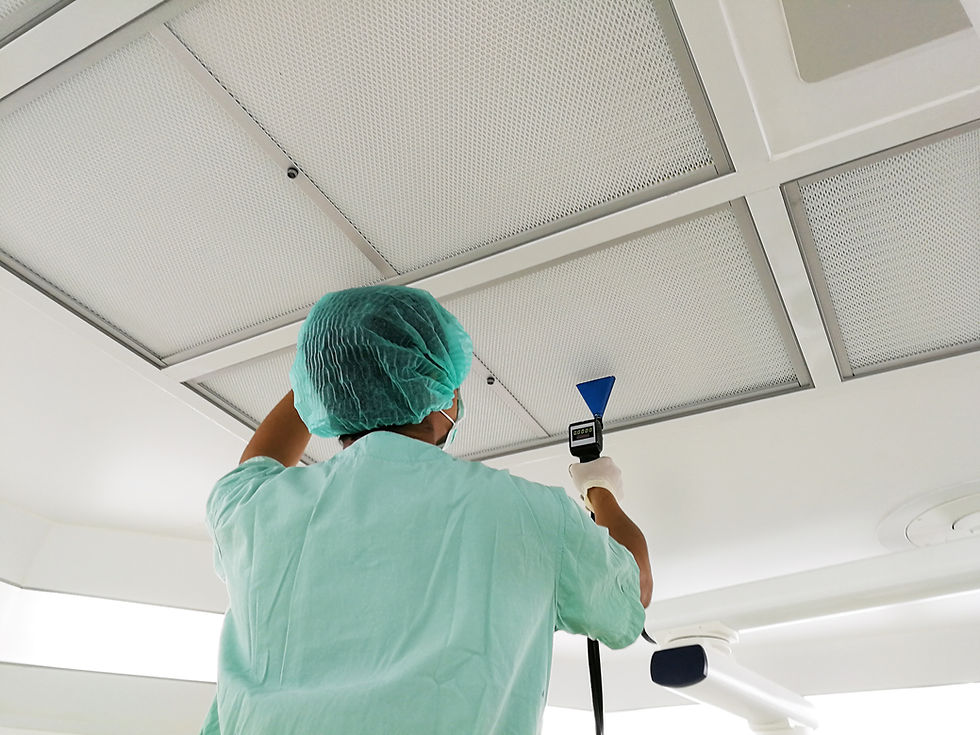HEPA Filters 102 - When to replace?
- Joseph Winslow

- Apr 15, 2021
- 4 min read

A couple years ago, I wrote an article in this blog entitled HEPA filters 101 https://www.jwconsultingengineers.com/post/2019/04/14/hepa-filters-101 and it was one of my most read blogs before or since. In this post, I am going to expand that information and discuss when to replace HEPA filters.
First, I should mention that my experience is in the Life Sciences Industry, so the information you are about to read is slanted a little in that direction, although much of it will also apply to any HEPA filter installation.
I was recently asked by a client if they were replacing their HEPA filters too often if they do it every 3 years. It costs this client $80,000 for this tri-annual event. My short answer is yes, but how often should you replace your HEPA filters? There are several things to consider.
1. Testing Results
2. Change in Pressure Drop across the filter.
3. Usage environment.
4. HEPA filter age.
5. Operating Costs vs Cost to replace.
Let us go through each one separately.
Testing results - In the Life Sciences Industry, HEPA filters are tested for integrity and airflow either once or twice per year. In addition to ensuring that the HEPA filter is not damaged (more on that later), this testing will reveal issues with the seal between the filter media and the filter frame, and changes in airflow uniformity across the filter. If you are trying to maintain a unidirectional or laminar flow environment, then uniform flow across the filter and between adjacent filters is important. So testing may inform the timing between HEPA replacements, and indeed, is the only criterion many companies use.
Pressure Drop - A good rule of thumb for changing out a HEPA filter given no other considerations is to replace the filter when the pressure drop across the filter increases to 150% of the initial pressure drop. This criterion may be an issue if you do not know the initial pressure drop, so take a note for next time you install a HEPA filter and document that. You should also think about how you can influence this change in differential pressure. Pre-filters are installed to protect the downstream HEPA filter, so naturally if you want the HEPA filter to last longer, you should have good pre-filtration and perform routine scheduled maintenance on those pre-filters.
Usage Environment – Obviously, if a HEPA filter is subjected to a harsh environment, it will not last as long as if it is not. A harsh environment may consist of multiple room cleaning cycles per day/week. Many biopharma companies in ISO 5 rooms, clean every inch of the ceiling and walls with tools which could cause damage to a filter, even if covered with a metal screen. Or your HEPA filters may be exposed to high humidity environments or be wetted directly by accident.
HEPA filter age – The major HEPA filter manufacturers have done studies on their filter media to see how age impacts the strength of the filter materials. Studies I have seen suggest that the filter media used in most HEPA filters starts to degrade around 7 years under normal usage. This testing was done in a laboratory and under tightly controlled conditions. It also does not say that when the material starts to degrade, the HEPA filter will cease to do its job. This is good data, but keep in mind, the HEPA filter manufacturers have some incentive to sell more filters! One other more recent development that I have seen at several client facilities is that with age, the gel seal on HEPA filters will break down and liquify, causing it to drip through into the room. If you see this phenomenon, there is a good chance that your HEPA filter is 15-20 years old and should be replaced immediately.
Operating Costs vs. Cost to Replace – Much of the engineering literature will tell you that as filters load up, they become more efficient, meaning that the materials caught in the filter will help the filter stop an even higher percentage of objectionable dust from penetrating the filter. This has to do with the 3 ways a filter uses to stop particles, but that discussion is beyond the scope of this article. The problem with filters loading up (besides the impact on airflow uniformity) is that when the filter is dirtier, the resistance to airflow is increased, and so the motor/fan will have to work harder to maintain a given airflow. The increased work equates to higher operating costs and more frequent motor maintenance/replacement which also means increased operating costs. Many engineering publications you read will tell you in detail how to calculate your operating costs and trend them, so that you can do an economic analysis to determine the optimum interval for HEPA replacement. This is not a bad approach, but in my experience, most engineers do not have the time, inclination, or data to do this analysis.
My recommendation to my clients in the Life Sciences industry are:
1. When installing new HEPA filters, document the pressure drop or better yet, put in instrumentation to measure it continuously.
2. When cleaning the room, do your best to keep HEPA filters dry and be careful not to damage them with cleaning tools.
3. Make sure you install good pre-filters upstream of the HEPA filters. Generally, in an air handler this is something like a 30-35% (MERV 1-4) filter followed by an 85-95% (MERV 8-14) filter. Leave this to the design engineer, MERV ratings can be confusing. Make sure you are maintaining these filters to protect the HEPA filters downstream.
4. Perform filter integrity (leak) testing and air flow testing at regular intervals and if the leak test passes and the flow across the filter and between adjacent filters is acceptable, then the filter does not need to be replaced.
5. If you have the resources, time and data required to do operating cost vs replacement cost analysis, then do so.
6. If all else fails, put your filters on a replacement schedule of 10-15 years. Plan to replace them in groups rather than all at once and plan for this replacement in your annual capital budget.





Comments